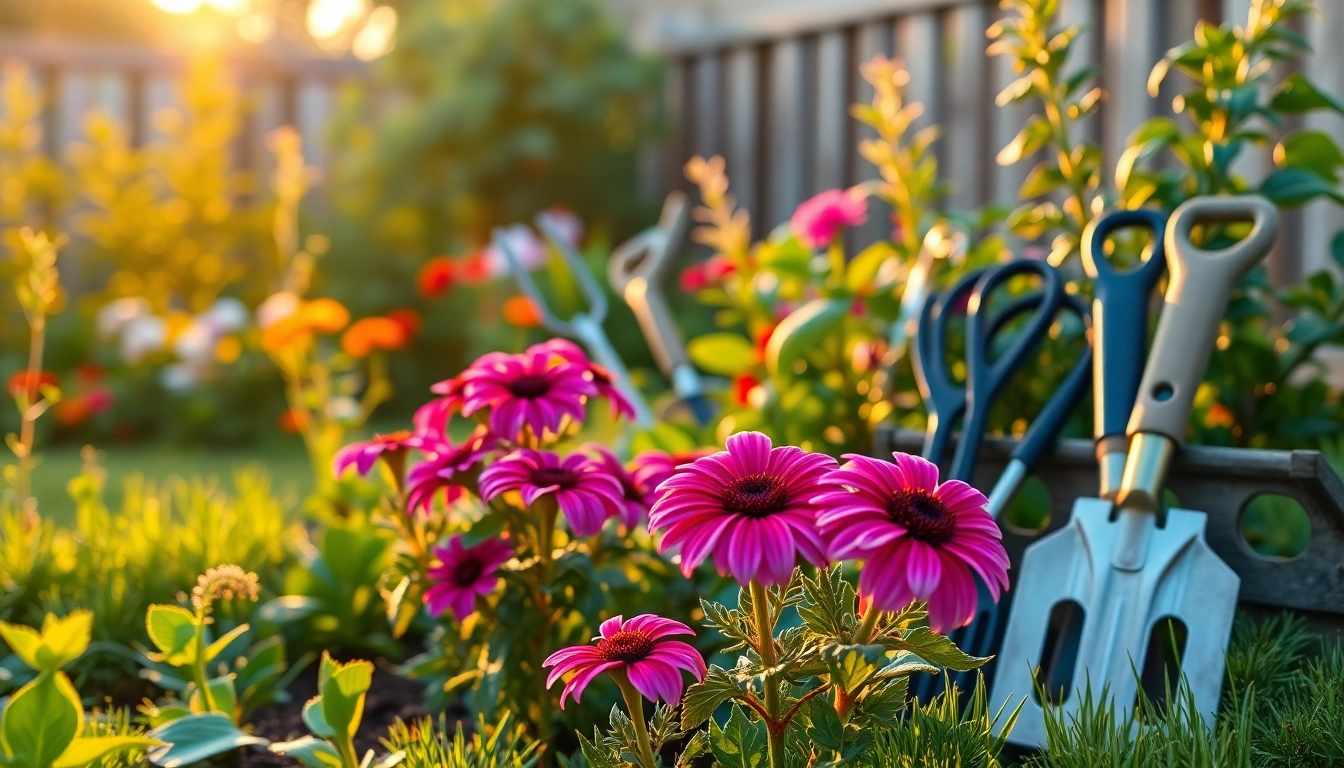Understanding Garden Maintenance
What is Garden Maintenance?
Garden maintenance encompasses all the activities required to ensure a garden remains healthy, vibrant, and aesthetically pleasing throughout the year. It involves a holistic approach to caring for plants, soil, garden structures, and even water sources. Regular tasks include watering, weeding, pruning, fertilizing, and pest control. Effective garden maintenance not only enhances the beauty of the space but also promotes the health of plants and improves the environmentally sustainable practices of a garden. For those looking to achieve a thriving outdoor oasis, mastering the art of garden maintenance is essential.
The Importance of Regular Maintenance
Regular garden maintenance is crucial for several reasons. Firstly, it enhances the visual appeal of the garden, making it a more enjoyable space for relaxation and entertainment. Secondly, consistent care helps prevent pests and diseases, as neglected plants are more susceptible to infestations. Additionally, regular maintenance keeps invasive weeds at bay, ensuring that your plants have the resources they need to thrive. Finally, well-maintained gardens can lead to increased property values, as prospective buyers often see clean, well-tended outdoor spaces as a reflection of good overall home maintenance.
Basic Tools Needed for Effective Garden Maintenance
Equipping yourself with the right tools is essential for efficient garden maintenance. The following tools should be staples in any gardener’s shed:
- Hand Trowel: Useful for digging, planting, and weeding.
- Pruning Shears: Essential for trimming plants and removing dead foliage.
- Hoe: Ideal for cultivating soil and removing weeds.
- Watering Can/ Hose: Necessary for keeping plants hydrated.
- Rake: Important for clearing leaves and debris.
- Gloves: Protect your hands while you work.
- Garden Fork: Useful for loosening and aerating soil.
Essential Gardening Practices
Watering Techniques for Healthy Plants
Watering is a fundamental aspect of garden maintenance. Understanding how and when to water your plants is crucial to their health. The best practice is to water deeply and infrequently, encouraging deeper root growth. Early morning is the ideal time for watering, as it allows plants to absorb moisture before the heat of the day. When using hoses or watering cans, aim for the base of the plants to minimize evaporation and fungal diseases that can arise from wet foliage.
Weeding Strategies to Enhance Garden Health
Weeds compete with your garden plants for sunlight, water, and nutrients; thus, effective weeding is vital. Hand-pulling is a practical method, especially after rain when the soil is moist. Mulching is another effective strategy, as it suppresses weed growth while retaining soil moisture. Additionally, consider using landscape fabric to block light from reaching the soil, reducing weed seed germination.
Fertilizing: Dos and Don’ts for Optimal Growth
Fertilizing is essential for supplying plants with necessary nutrients. Here are some key dos and don’ts:
- Do: Conduct a soil test to determine nutrient deficiencies.
- Do: Use organic fertilizers like compost or well-rotted manure.
- Don’t: Over-fertilize, as this can cause plant burn and environmental damage.
- Don’t: Apply fertilizer during extremely hot or dry conditions.
Seasonal Garden Maintenance
Spring Preparations: Getting Started
Spring is the season of rebirth in gardens. It’s the perfect time to assess the garden post-winter and start with necessary cleanups:
- Remove debris, dead plants, and leaves.
- Prepare the soil through tilling and adding compost.
- Plant new seeds and transplants for the season.
Summer Care: Keeping Your Garden Lush
During the summer months, the focus shifts to maintenance tasks that keep plants nourished and healthy. Important practices include:
- Consistent watering, especially in hot spells.
- Regular deadheading of flowers to promote blooming.
- Monitoring for pests and diseases, acting quickly if issues arise.
Fall Cleanup: Preparing for Winter
As summer ends, fall cleanup becomes necessary. This period includes several critical tasks:
- Collect fallen leaves and organic debris to prevent fungal diseases.
- Cut back perennials and prepare the garden for the winter dormant period.
- Apply mulch to protect the roots from freezing temperatures.
Pest Management in Garden Maintenance
Identifying Common Garden Pests
Familiarizing yourself with common pests is essential for effective management. Common garden invaders include aphids, spider mites, and slugs. Identification is the first step, as different pests require different control measures. Regular inspections of your plants can ensure that any issues are addressed before they become severe.
Natural Remedies for Pest Control
Many gardeners prefer organic remedies for pest control to minimize impact on beneficial insects and the environment. Some popular methods include:
- Neem Oil: Effective against a variety of pests.
- Insecticidal Soap: Assists in killing soft-bodied insects.
- Garlic Spray: Acts as a repellent due to its strong odor.
Preventative Measures to Deter Infestations
Prevention is often better than cure when it comes to pests. Some preventative measures include:
- Encouraging beneficial insects, such as ladybugs.
- Practicing crop rotation to disrupt pest life cycles.
- Avoiding over-fertilization, which can attract pests.
Professional Garden Maintenance Services
When to Hire a Professional Gardener
While many gardening tasks can be completed by homeowners, there are instances when hiring a professional becomes necessary. Consider engaging a professional gardener when:
- You’ve encountered severe pest or disease issues.
- Major landscaping projects need specialized skills.
- You lack the time or physical ability to maintain your garden.
Choosing the Right Maintenance Service
Choosing a gardening service involves several factors. Start by assessing the following:
- Check for experience and specialization in the type of gardening you require.
- Review customer testimonials and ratings.
- Ask about their sustainability practices.
Questions to Ask Your Gardening Professional
When interviewing potential gardening services, ask pointed questions to ensure you make an informed choice:
- What services do you offer?
- Can you provide a detailed estimate for the work?
- How do you handle pest management?
